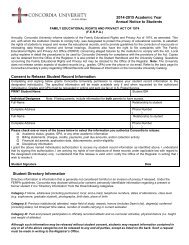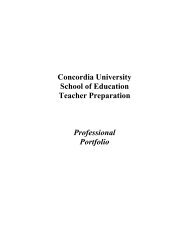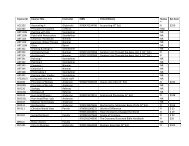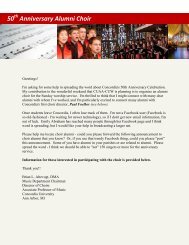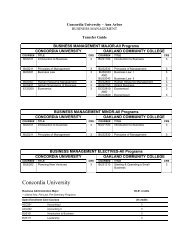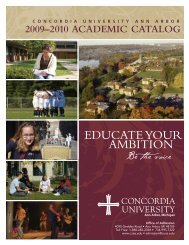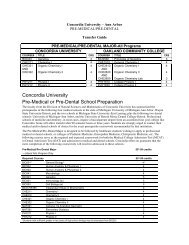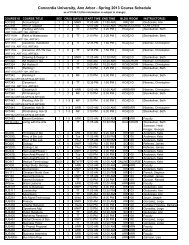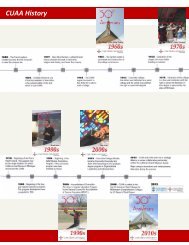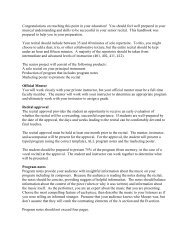2006â2007 Academic Catalog - Concordia University Ann Arbor
2006â2007 Academic Catalog - Concordia University Ann Arbor
2006â2007 Academic Catalog - Concordia University Ann Arbor
You also want an ePaper? Increase the reach of your titles
YUMPU automatically turns print PDFs into web optimized ePapers that Google loves.
36 |<br />
DEGREE REQUIREMENTS<br />
This core area concerns the relationship of humans to their past as a form of inquiry and<br />
understanding, including broad ranging explanations of major aspects of the modern world,<br />
global or near-global in their scope. In addition, students need a sharper focus on detailed<br />
controversial and transforming events, now removed in time that can be studied in detail<br />
without contemporary passions, though not without value framework and biases. The aim<br />
is developing an understanding of the intricacy of an event that through individual decisions<br />
helped shape a portion of the modern world. The content in this category need not<br />
concern only matters of politics and economics, the substance of traditional history, but<br />
may include material from the arts, science, literature, and religion.<br />
Course Requirements<br />
Lower level: Any HER100-299 course<br />
Upper level: Any HER300-499 course<br />
Institutions<br />
Description of Category<br />
Society is organized. We work, act, and worship within institutions and bureaucracies and<br />
groups. It is extremely important to a life of service that students understand how institutions,<br />
and the individuals within them, function. The focus of the core here is on the relationship<br />
of human to human and on the cooperative completion of tasks. Though this core<br />
area will borrow heavily from social science concepts and methods, it is not intended to<br />
provide a broad survey of all the social sciences. Instead, the intent of this core area is to<br />
show what we understand and how we can better understand the behavior of people and<br />
institutions. Since institutions operate within every part of society, courses in this area could<br />
select content from any aspect of human endeavor and analyze it from several viewpoints.<br />
Course Requirements<br />
Lower level: Any INS100-299 course<br />
Upper level: Any INS300-499 course<br />
Language<br />
3 credits<br />
Description of Category<br />
The study of language is an encounter among people who name the world. Its use is an act<br />
of creation implicit in our history, reflected in our social and political institutions, and profoundly<br />
identified with our calling in the world. The focus here is on how humans develop<br />
and use symbols of all kinds to tell others about themselves and their needs. The methods<br />
involve the exploration of existing texts, both spoken and written, as well as the production<br />
of materials that communicate student viewpoints. Moreover, because symbolic expression<br />
moves beyond reading and writing, this core area should include visual, graphic, and aural<br />
dimensions of human experience.<br />
Course Requirement<br />
The requirement has the following options:<br />
Spanish, French, German, Classical Greek or Biblical Hebrew at the intermediate level 3 credits<br />
OR<br />
LAN282 Language, Communication, and Culture<br />
3 credits<br />
Nature<br />
6 credits<br />
Description of Category<br />
Human culture exists within and depends upon the relationship between humans and the<br />
environment in which they live. This core area emphasizes the principles about the physical



